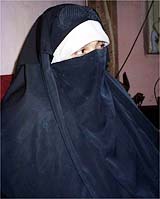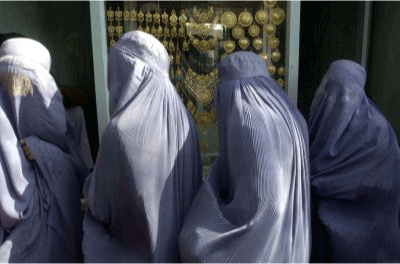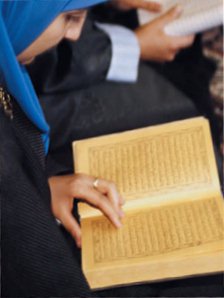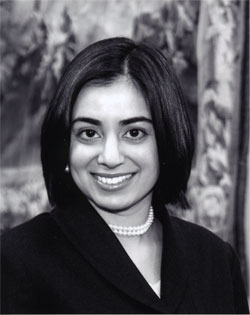 |
||||
|
Behind the Veil, a Muslim Feminist
By Barry Bearak. Kashmir - Asiyah Andrabi, conservative Muslim and radical feminist, believes that women should be heard and not seen, so she makes her demands for equal rights from behind the black cloth curtain of an all-enveloping burqa. "The veil is for security as Allah wishes it," she said, pausing to refresh her hidden mouth with sips of Coca-Cola. "If gold is left uncovered along a roadside, anyone will grab it, because it is a precious thing. It is the same with an uncovered woman." There are other reasons for Ms. Andrabi to conceal her face. She is a militant who opposes Indian rule here. For most of the last decade she has been living either in jail or on the lam, alternating her efforts between the liberation of women and that of Kashmir. Indian intelligence agents say they suspect that she is a conduit for money to guerrilla groups. But her notoriety is owed to flamboyant rather than clandestine activities. As head of Dukhtaran-e-Millat, or Daughters of the Community, she has led hundreds of women in street protests. At times they have carried brushes and paint cans beneath their burqas, blackening any advertisements that show scantily clad models. With the same sense of righteousness, Ms. Andrabi has also tossed colored dye into the faces of Muslim women who shun the veil. Western dress is popular here in Srinagar, the summer capital of the state of Jammu and Kashmir.
Often Ms. Andrabi is not. "Such upstarts are like a plague for us," said one older Muslim woman. With so well-known a reputation and so little-known a face, Ms. Andrabi, 37, carries about her short frame a sense of mystery. But she is hardly press-shy, alerting favorite reporters whenever she calls a protest. Interviews with her are rare, though. She phones the reporters, not the other way around. Rendezvous are set, broken, reset. Finally, she kept a date, arriving late with her 8-month-old son asleep on her shoulder. "To people from the West I may seem a contradiction," she said in excellent English, her diction a tip-off to an upbringing in a wealthy family and a college education. "But I have never felt that this veil -- this purdah -- has been a hardship to my work." As if to serve up a suitably vexing contradiction to her self-declared feminism, she said that lately she had been nagging her husband to marry a few extra wives. She explained: "Allah says a man can marry one, two, three or four wives, but he must have the means to do justice to them all. The jihad against India has left so many widows and orphans. A man has a responsibility to look after them." She told her life story. Her father, a doctor, was a devout Muslim. But while he urged her to get a secular education, he encouraged only his sons to study the Koran. She studied biochemistry at college in Srinagar. But when she wanted to get an advanced degree, she said, her family refused to let her leave home. While in a prolonged sulk, she happened on a book about women who had converted to Islam. "It shocked me that I was so unfamiliar with my own religion," she said. "It is a tragedy that only men go to the mosque, and women are told their only duty is to look after the children. In truth, Islam grants individuality to men and women. In heaven, before Allah, a woman, too, will be asked about her worldly deeds." She studied the Koran -- and encouraged other women to do the same. "Our society cruelly restricts women, from the words of the Prophet, from school, from jobs," she said, her voice taking on an angry edge. "But in today's world women can even be astronauts. So they must be educated. You know, an ignorant woman cannot answer even the simplest question from her child, and a mother must be the first school for her children."
In 1989 a revolt erupted in the predominantly Muslim Kashmir Valley, an insurgency that still goes on. Ms. Andrabi believes now, as she believed then, that Kashmir ought to sever itself from India and become part of Pakistan, an Islamic state that in her view needs to do better by its own women and be truer to its faith. "I believe the whole universe should be governed by the laws of Islam, and Allah says all Muslims should be united as one," she said. The Kashmir dispute involves dozens of political parties and soldierly factions, some foreign, some domestic, some Islamic, some secular. There is usually little role for women in such a male-dominated occupation as holy war. "The social milieu does not allow it," said Abdul Ghani Bhat, the leader of an umbrella group of Kashmiri organizations. "It's hard for a woman to go into the market to make a speech or go into the forest to shoot a gun." Ms. Andrabi, then, is quite the exception. Her husband, Muhammad Qasim, who belongs to the militant group Jamiat-ul-Mujahadeen, is her life partner in jihad. In 1990, at age 27, she told her father that she would accept an arranged betrothal so long as the groom was active in the insurgency. She met Mr. Qasim on the day of their wedding, she said. Each has been arrested several times. Indian jails are brutal places, Ms. Andrabi complained. In 1993, when their first son was a baby, she was jailed for 13 months. The infant was allowed to stay with her. "But all he had was my breast milk," she said. "They gave him not even a biscuit." She wants her sons to grow up with gun in hand. "I want them to be mujahids," she said. "I never pray or dream that they be doctors or prime ministers. I want them to be mujahids who fight for the cause of holy Islam." If she ever has a daughter, she said, maybe she will be a prime minister.
Here Are the Muslim Feminist Voices, Mr. Rushdie!
Salman Rushdie tells us in his Op-Ed essay in the New York Times (Friday, Nov 2, 2001), that "highly motivated organizations of Muslim men"-whom he labels "Islamists"-have been "engaged over the last 30 years or so in growing radical political movements" all over the Islamic world, movements that have produced the terrorists who not only destroyed the symbols of the freedom-loving West and killed 6000 innocent people in the process on 9/11, but who have been systematically destroying the very societies of which they are a part, with much of their savage venom focused on the female citizenry. In a parenthetical aside, Mr. Rushdie sighs, "(oh, for the voices of Muslim women to be heard!)" Well, I have news for Mr. Rushdie. Muslim women have been speaking out against the obscurantist Islam he decries in his essay, for years and years and years, although clearly Mr. Rushdie, and many others, have not paid them much heed. There are Muslim women who are feminists, theologians, writers, lawyers, activists, scholars both in the "Islamist" societies he paints with a broad brush, as well as in the "west," who have been engaged in a two-pronged struggle against both Islamic extremism as well as-and this is where their difference from Mr. Rushdie arises-the unjust foreign policies of the United States that have contributed, and continue to contribute, to the "hijacking" of Islam for terrorist ends. Shall I name a few? Dr. Nawal El Saadawi is one, a dear friend and my colleague these days at Montclair State University, who has written over 20 novels exposing the hypocrisy of Egypt's rulers in their cynical use and abuse of Islam to whip up public support for their repressive policies against free-thinking writers and intellectuals like herself. For her criticism of Egyptian state repression (aided and abetted by the foreign intervention of the United States), she got thrown into jail by Anwar Sadat, a so-called anti-Islamist! She is currently in self-imposed exile here after having suffered an attempt by the Egyptian authorities last summer to have her declared a heretic, a blasphemer against Islam and the holy Prophet. But she--like her many counterparts all over the Muslim world, such as Asma Jahangir of Pakistan, Fatema Mernissi of Morocco, or the women of RAWA, the Revolutionary Association of Women in Afghanistan, to name but a few--is not willing, unlike Mr. Rushdie, to comprehend what happened on 9/11 merely in terms of Islam and its regressive politics of blame directed at the West, and particularly at the United States. In a conversation I had with her shortly after the attacks on the WTC and Pentagon, she expressed the hope that the attacks, devastating as they undoubtedly were, might, in the long run, prompt the U.S. to rethink its foreign policy, particularly in the Middle East. While I think Rushdie is correct in asking Muslim societies to look inward, to take "responsibility for many of our own problems" so that we can then begin to "solve them for ourselves," he is disingenuous in implying that such "problems" can be "fixed" in isolation from global politics and economics. In an essay entitled, "At Critical Crossroads," published in Dawn, the largest circulating English-language daily of Pakistan , Asma Jahangir, leading advocate of Human and Women's Rights and President of the Human Rights Commission of Pakistan, (who has herself had to face innumerable death threats from "Islamists" for her courageous defense of women victims of the most hideous "crimes of honor"), writes from a"both/and" perspective regarding the 9/11 catastrophe, in contradistinction to Rushdie's univocal analysis. She observes that while the people of Pakistan, familiar with acts of terrorism and their consequences, have almost unanimously condemned the killing of innocent people in New York and Washington, and that while "there can be no justification for, nor rationale behind such acts," nevertheless, such a terrible deed does call for reflection by the entire world leadership. Like Rushdie, she exhorts the "Muslim world to correct its rhetoric against 'infidels' and promote a culture of democracy and tolerance within their own countries," yet, she simultaneously-and in contradistinction to Rushdie-insists that "The North needs to change its policies toward the South." She goes on to tell us that while the majority of Pakistanis do NOT support the Taliban regime, their lack of support for them "is not because they respect the U.S.-whom they closely associate with the Israeli atrocities against the Palestinians-but because there is growing resentment against domestic jihadi groups and disrespect for the Taliban style of government." Should her reporting of Pakistani sentiment against unjust Israeli policies toward the Palestinians be read as evidence of Pakistani "anti-Semitism" and "Islamic slander against Jews" as Rushdie seems to suggest? That would hardly seem justified here. What about the statements we have seen in recent weeks from RAWA, posted on the internet? In these, we are hearing the voices of revolutionary Afghani women who have been speaking out against the atrocities of the Taliban regime for the past twenty years at grave risk to their own lives, yet, who has been listening? In a statement that began circulating on September 14th, these women express their "deep sorrow and condemnation for this barbaric act of violence and terror" that was committed against the innocent people of the United States, yet they also wish to remind the world that, unfortunately, it was "the government of the United States who supported Pakistani dictator General Zia-ul-Haq in creating thousands of religious schools from which the germs of the Taliban emerged." They also point out that Osama Bin Laden had, at one time, been the "blue-eyed boy of the CIA." What is scariest of all, perhaps is the following observation, that "American politicians have not drawn [sic] a lesson from their pro-fundamentalist policies in our country and are still supporting this or that fundamentalist band or leader." They are, ofcourse, referring to the U.S support of the so-called Northern Alliance, which, according to a spokeswoman of RAW I heard just a few days ago at Judson Memorial church in Greenwich Village, has committed worse atrocities than even the Taliban, including the rape of 70 year old women. Do all of these observations of the Revolutionary Women of Afghanistan amount to an unfair and crippling "politics of blame" against the U.S. as Rushdie would have it? And if so, what does it mean that such a misguided view of world politics is held and being propagated here NOT by fundamentalist "Islamists," but by their victims and staunchest critics, the ordinary Muslim (not Islamist) women of Afghanistan? Perhaps we should consider carefully the bone-chilling consequences foreshadowed by RAWA in the following statement: "The U.S. government should consider the root cause of this terrible event, which has not been the first, and will not be the last one too." Perhaps we should read this statement juxtaposed next to a statement issued by the Joint Action Committee for Citizens Rights and Peace, a committee comprised of the Institute of Women's Studies , Lahore (IWSL), as well as several other women's groups and NGOs in Pakistan, and issued on October 3rd, 2001.
|
|
|||
|
|
||||
|
"Civilization," note the JAC members, "is not synonymous with capitalism or global political and economic power." Hence, the members of this coalition committee strongly believe that forms other than the use of violence can, and must, be worked out for conflict resolution, and they are therefore, unequivocally (like RAWA), against the U.S waging war on the innocent people of Afghanistan.
They are quick to point out that in the current crisis in which the world finds itself, America has played no small role, to say the least; such an analysis leads them to the inevitable conclusion that echoes RAWA's warning: In this context the international community must note the resentment generated by insensitive and unjust policies of the United States, particularly in their unconditional support to the aggressive policies of Israel towards the people of Palestine and in their sustained campaign against the people of Iraq. It should be remembered that much of the terrorism in Afghanistan and Pakistan stems from international interventions in the region including by the United States for its own political ends in which Osama Bin Laden himself was originally an ally of the U.S. Lest we be led into agreeing with Rushdie's thesis that such an analysis smacks of a "paranoic" Islamism that wishes to "blame all its troubles on the West and, in particular, the United States," we would do well to remind ourselves that the statement was issued by largely secular, certainly anti-Islamist women's groups and NGOs of Pakistan, who make explicitly clear that they have, in keeping with the "both/and" imperative I referred to earlier, "persistently called upon the authorities in Pakistan to take a firm stand against those groups that have promoted violence, sectarianism, and extremism in our country." Thus, it is indeed possible, I would say crucially important, to comprehend the current world crisis not in a simplistic way as "this is about Islam" or "no it is not about Islam," but in the complex ways that the women of the Muslim world have been seeing and describing it even before T-Day 9/11. The world should listen to these voices, the female voices allied with the "secularist-humanist principles" Rushdie seems to think don't exist in the Islamic world.
|
||||
 |
|
 |
||



